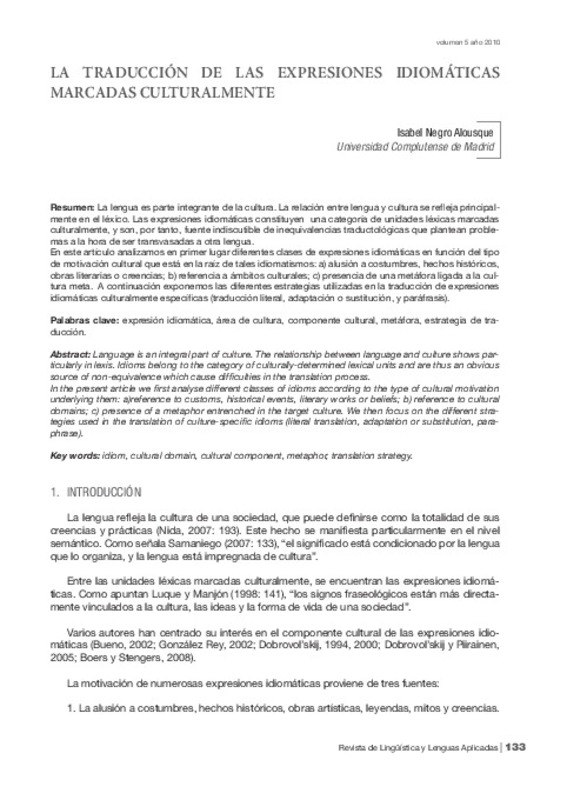JavaScript is disabled for your browser. Some features of this site may not work without it.
Buscar en RiuNet
Listar
Mi cuenta
Estadísticas
Ayuda RiuNet
Admin. UPV
LA TRADUCCIÓN DE LAS EXPRESIONES IDIOMÁTICAS MARCADAS CULTURALMENTE
Mostrar el registro sencillo del ítem
Ficheros en el ítem
| dc.contributor.author | Negro Alousque, Isabel
|
|
| dc.date.accessioned | 2011-04-05T11:50:40Z | |
| dc.date.available | 2011-04-05T11:50:40Z | |
| dc.date.issued | 2010 | |
| dc.identifier.issn | 1886-2438 | |
| dc.identifier.uri | http://hdl.handle.net/10251/10679 | |
| dc.description.abstract | [EN] Language is an integral part of culture. The relationship between language and culture shows particularly in lexis. Idioms belong to the category of culturally-determined lexical units and are thus an obvious source of non-equivalence which cause diffi culties in the translation process. In the present article we fi rst analyse different classes of idioms according to the type of cultural motivation underlying them: a)reference to customs, historical events, literary works or beliefs; b) reference to cultural domains; c) presence of a metaphor entrenched in the target culture. We then focus on the different strategies used in the translation of culture-specifi c idioms (literal translation, adaptation or substitution, paraphrase) | es_ES |
| dc.description.abstract | [ES] La lengua es parte integrante de la cultura. La relación entre lengua y cultura se refl eja principalmente en el léxico. Las expresiones idiomáticas constituyen una categoría de unidades léxicas marcadas culturalmente, y son, por tanto, fuente indiscutible de inequivalencias traductológicas que plantean problemas a la hora de ser transvasadas a otra lengua. En este artículo analizamos en primer lugar diferentes clases de expresiones idiomáticas en función del tipo de motivación cultural que está en la raíz de tales idiomatismos: a) alusión a costumbres, hechos históricos, obras literarias o creencias; b) referencia a ámbitos culturales; c) presencia de una metáfora ligada a la cultura meta. A continuación exponemos las diferentes estrategias utilizadas en la traducción de expresiones idiomáticas culturalmente específi cas (traducción literal, adaptación o sustitución, y paráfrasis). | |
| dc.language | Español | es_ES |
| dc.publisher | Editorial Universitat Politècnica de València | es_ES |
| dc.relation.ispartof | Revista de Lingüística y Lenguas Aplicadas | |
| dc.rights | Reserva de todos los derechos | es_ES |
| dc.subject | Expresión idiomática | es_ES |
| dc.subject | Área de cultura | es_ES |
| dc.subject | Componente cultural | es_ES |
| dc.subject | Metáfora | es_ES |
| dc.subject | Estrategia de traducción | es_ES |
| dc.title | LA TRADUCCIÓN DE LAS EXPRESIONES IDIOMÁTICAS MARCADAS CULTURALMENTE | es_ES |
| dc.type | Artículo | es_ES |
| dc.date.updated | 2011-04-01T13:13:20Z | |
| dc.identifier.doi | 10.4995/rlyla.2010.762 | |
| dc.rights.accessRights | Abierto | es_ES |
| dc.description.bibliographicCitation | Negro Alousque, I. (2010). LA TRADUCCIÓN DE LAS EXPRESIONES IDIOMÁTICAS MARCADAS CULTURALMENTE. Revista de Lingüística y Lenguas Aplicadas. 5:133-140. https://doi.org/10.4995/rlyla.2010.762 | es_ES |
| dc.description.accrualMethod | SWORD | es_ES |
| dc.relation.publisherversion | http://doi.org/10.4995/rlyla.2010.762 | |
| dc.description.upvformatpinicio | 133 | |
| dc.description.upvformatpfin | 140 | |
| dc.description.volume | 5 | |
| dc.identifier.eissn | 1886-6298 | es_ES |








